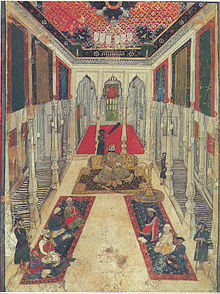Our website is made possible by displaying online advertisements to our visitors.
Please consider supporting us by disabling your ad blocker.
Mankari


Mankari (Mānkari or Maankari) is a hereditary title used by Maratha nobles[1][2] and troops[3] from the Indian subcontinent who held land grants, and cash allowances.[4] They held an official position at the Darbar (court) and were entitled to certain ceremonial honours and presents rendered at courts, councils, weddings, festivals, village assemblies, etc. They were worthy of distinction and the honour bestowed upon them was the result of the military, bureaucratic or fiscal importance of them or their distinguished ancestors.[5][6]
The term was widely used by Maratha nobility, who held important positions in various princely states of the Maratha Empire.[7][8]
- ^ Imperial Record Dept India (1959). Calendar of Persian Correspondence. Superintendent Government Printing. Retrieved 2015-01-11.
- ^ Pandey, R. G. (1980). Mahadji Shinde and the Poona Durbar. Oriental Publishers & Distributor. Retrieved 2006-01-10.
- ^ Vaidya, S. G. (1975). Peshwa Bajirao II and the Downfall of the Maratha Power. Pragati Prakashan. Retrieved 2005-03-11.
- ^ Central India; Luard, C.E. (1908). The Central India State Gazetteer Series. Thacker, Spink. Retrieved 2015-07-12.
- ^ Madan, T.N. (1988). Way of Life: King, Householder, Renouncer : Essays in Honour of Louis Dumont. Motilal Banarsidass. p. 129. ISBN 9788120805279. Retrieved 2015-07-04.
- ^ Russell, Robert Vane (1916). "Pt. II. Descriptive articles on the principal castes and tribes of the Central Provinces".
- ^ O'Hanlon, R. (2002). Caste, Conflict and Ideology: Mahatma Jotirao Phule and Low Caste Protest in Nineteenth-Century Western India. Cambridge University Press. p. 45. ISBN 9780521523080. Retrieved 2015-07-12.
- ^ Gokhale, Balkrishna Govind (1988). Poona in the eighteenth century: An urban history. ISBN 978-0-19-562137-2.
Previous Page Next Page


